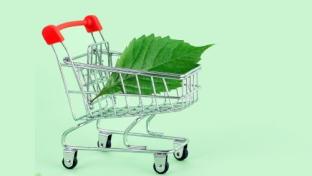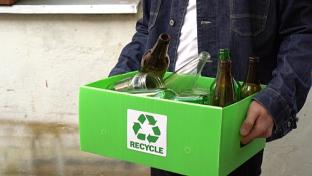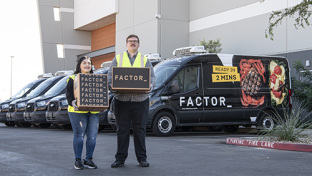The Top 5 Conscientious CPG Companies
Special SUSTAINABILITY COVERAGE
There’s no shortage of consumer packaged goods companies that are doing their bit to help make the planet a better place for us to live, but the five companies profiled below are doing an especially stellar job in that department.
From ambitious goals to achieve net-zero greenhouse-gas emissions to innovative consumer-facing campaigns, Hormel Foods, PepsiCo, Procter & Gamble, Stonyfield, and Unilever have all placed more earth-friendly policies at the center of what they do. Such moves by these companies and many others are in direct response to consumers’ evolving attitudes toward sustainability. According to a recent report from on-demand consumer research program Glow, a Nielsen IQ partner, shoppers are increasingly “shedding the brands that don’t meet their sustainability expectations, and moving to brands that better align with their values.”
Glow adds that younger consumers in particular are switching brands at much higher rates than those of other demographics, with brands leading in environmental, social and governance perceptions benefiting the most. This propensity for switching to more sustainable brands is especially high within food and grocery. The consumer researcher uncovered rates of between 30% and 40% in food and grocery departments. The risk of switching was greatest in health and beauty, meat, beverages, and household products, but even among lower-risk categories like bakery and dairy, Glow cautions that “no business can risk losing up to a third of its customers!”
Given these figures, it’s imperative that companies get their sustainability stories out there, and all of the CPG businesses spotlighted by Progressive Grocer have done an admirable job of this. In fact, Dawn, a brand of Procter & Gamble, was identified as the most responsible food and grocery brand by consumers, according to Glow’s research, while Dove, manufactured by Unilever, came in fifth and Quaker, one of PepsiCo’s brands, was No. 10.
To find out what PG’s five profiled companies are doing right when it comes to sustainability, read on.
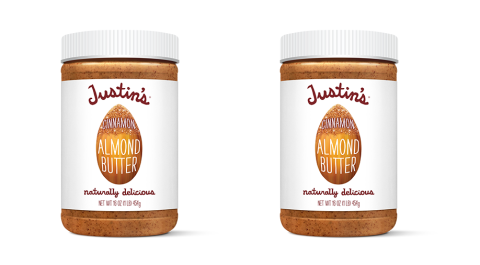
Hormel Foods Corp.
Last month, in a testament to its longstanding commitment to making the planet a better place to live, Hormel Foods Corp. was named to Barron’s list of the 100 most sustainable U.S. companies for 2023, coming in at No. 23. To come up with its sixth annual list, the business publication evaluated the 1,000 largest publicly traded companies across more than 200 environmental, social and governance performance indicators.
Through its award-winning Our Food Journey program, Austin, Minn.-based Hormel strives to produce food responsibly by investing in its people and partners, improving communities and the world, and creating products that enrich peoples’ lives. The company also has an ambitious set of corporate responsibility goals that it will aim to achieve by 2030, known as the 20 by 30 Challenge. This includes initiatives related to climate leadership, regenerative and sustainable agriculture, packaging sustainability, water stewardship, food security, and human rights.
“As a Fortune 500 global branded food company, we must take a leadership position in addressing climate change,” Tom Raymond, Hormel’s director of sustainability, tells Progressive Grocer. “One of our 20 by 30 challenge goals is our commitment to set a Science Based Target for the reduction of greenhouse-gas emissions by 2023. We submitted our materials into the Science Based Targets Initiative for validation in mid-2022, and we are currently in the active validation period. We expect to have an aggressive goal set that will include targets for our emissions and our supply chain this year.”
Adds Raymond: “We know we have a responsibility to our team members, shareholders, customers, consumers and communities. In fact, our 20 by 30 challenge goals are some of the most robust in the industry, and we are working hard to achieve them. As a company, we remain committed to continuous improvement, and these 20 qualitative and quantitative goals and commitments will help make the world a better place for everyone.”
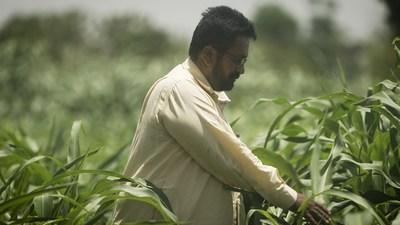
PepsiCo
Since PepsiCo is the largest food and beverage company in North America, and the second largest globally, a resilient food system is essential to its business. In March, the Purchase, N.Y.-based company revealed a $216 million multiyear investment in long-term strategic partnership agreements with three farmer-facing organizations — Practical Farmers of Iowa, Soil and Water Outcomes Fund, and the Illinois Corn Growers Association — to drive adoption of regenerative agriculture practices nationwide. The combined impact of these three partnerships is expected to support the accelerated uptake of climate-smart regenerative practices on more than 3 million acres and deliver approximately 3 million metric tons of greenhouse-gas emission reductions and removals by 2030. Based on progress to date, these collaborative efforts are expected to deliver more than 500,000 regenerative acres by the end of 2023.
PepsiCo is also combating the nation’s water crisis with the help of its Frito-Lay subsidiary. The companies have revealed a commitment of $3.3 million in funds toward water replenishment projects across North America. These projects will advance PepsiCo’s ambitious effort to become net water positive by 2030, which includes reducing absolute water use and replenishing the local watershed with more than 100% of the water used at company-owned and third-party sites in high water-risk areas.
The company’s efforts have been recognized with the 2023 Industrial Water Reuse Champions Award, from the WateReuse Association, the U.S. Chamber of Commerce, Veolia and the University of Pennsylvania Water Center, for best-in-class water recycling and reuse programs inside and outside its plants.
Additionally, PepsiCo is applying its reuse strategy to packaging. The company unveiled its global packaging goal to double the percentage of all beverage servings it sells delivered through reusable models from 10% to 20% by 2030. Reuse is a critical component to meet PepsiCo’s aims of reducing virgin plastic per serving by 50% by 2030 and to become net zero by 2040.
To achieve these objectives, PepsiCo will expand its SodaStream business, both at home and in workplaces through SodaStream Professional; build out its refillable plastic (PET) and glass bottle offerings in partnership with PepsiCo bottlers; grow its fountain drink business with reusable cups; and accelerate growth in powders and concentrates.

Procter & Gamble
According to a recent Procter & Gamble study of U.S. consumers, more than half — 55% — said that they don’t make environmentally conscious choices at home as often as they’d like, so the Cincinnati-based CPG powerhouse decided to lend a helping hand through the third iteration of a popular initiative.
“P&G’s #ItsOurHome campaign is designed to show that sustainable choices don’t have to be hard: There are easy ways for consumers to live a more sustainable lifestyle, get great results from the products they love and — in some cases — even save money on household bills,” explains Megan Timberlake, SVP of sales at the company, serving on its Walmart team and as the North America sustainability commercial leader. “The highest environmental footprint of many everyday tasks — like doing laundry, washing dishes and washing our hair — comes from the water and energy needed to do the job. P&G scientists are innovating to design superior products to help save energy, water and waste without tradeoffs in performance. That’s why this chapter of the #ItsOurHome campaign is called Made Better, Made to Save.”
During the campaign, shoppers will be able to take advantage of in-store rebates for Cascade, Tide and many more well-known brands, and can get involved at P&G Good Everyday, a free rewards program that helps turn everyday actions into acts of good.
Beyond #ItsOurHome, P&G is focusing on four areas where the company believes it can make the biggest difference for its business and the planet: climate, waste, water and nature. This includes goals to achieve net-zero greenhouse-gas emissions across its operations and supply chain by 2040; have all of its consumer packaging be recyclable or reusable by 2030; reduce water in its operations to help conserve local water supplies; and ensure responsible sourcing of key commodities like wood pulp, palm oil and paper packaging.
When asked what the future of sustainability for CPG companies looks like, Timberlake replies: “People increasingly want products that perform and delight while leaving a smaller environmental footprint. This is a big opportunity for our industry to create value for people and the planet. Retailers and CPG companies can make it easier for consumers to lead more sustainable lives without sacrificing product performance.”
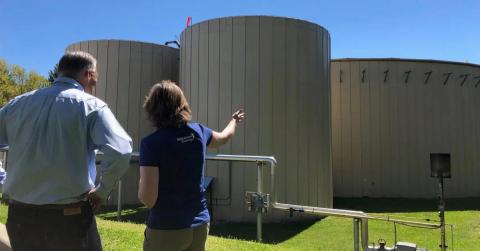
Stonyfield Organic
If they didn’t actually write the book on sustainable farming and food production, the founders of Stonyfield Organic did get their start schooling others on the importance of nourishing the land and animals to best nourish people. Gary Hirshberg and the late Samuel Kaymen operated a nonprofit farming school in New Hampshire, an educational endeavor that led to the production of yogurt made with milk from the farm’s cows.
Flash-forward 40 years, and Stonyfield remains a thought leader and innovator in organic foods. Supporting a network of organic family farms and providing dozens of organic yogurts, smoothies, and milk and cream products, the producer runs a parallel track learning about and implementing sustainable practices.
In 2021, for instance, Stonyfield unveiled a move to use 100% renewable energy at its Londonderry, N.H., manufacturing facility by buying renewable energy credits and supporting the construction of new solar projects in the East and Midwest regions of the country. The company has also invested in new materials and systems to make its packaging more sustainable, switching from petroleum-based to plant-based cups for its yogurt products.
Stonyfield is making additional progress toward its goal of reducing its carbon output by 30% by 2030. The company is one of 50 in North America with an approved Science Based Targets Initiative goal in that regard.
Just as science was behind some of the lessons on its original farm, that discipline guides the company’s efforts today. Stonyfield has assumed an important role in creating a new technology platform that helps farmers trap carbon from the atmosphere in the soil, which improves soil health while reducing emissions. The eco-minded producer also supported research on testing seaweed from the Gulf of Mexico as a feed additive for enteric methane reduction, and partnered with The Organic Center to create a toxins calculator tool demonstrating the impact of consuming organic products.
Co-founder Hirshberg still takes up the mantle for helping people and the planet, recently forming a partnership to save organic dairy farms in the Northeast.
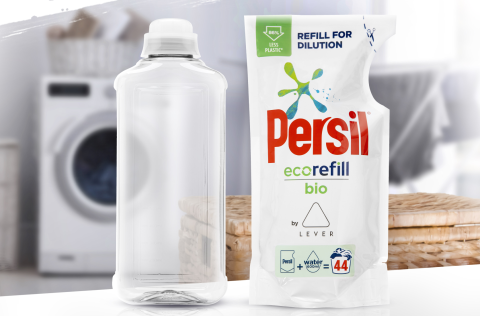
Unilever
Unilever is made up of brands and people with a purpose to make sustainable living commonplace. The multinational company, whose U.S. headquarters is in Englewood Cliffs, N.J., is taking steps to achieve net-zero emissions across its value chain by 2039 while also transitioning to renewable energy across its operations, finding new low-carbon ingredients, expanding its plant-based product range, and developing cleaning and laundry products free of fossil fuels.
The company’s vision for a nature-positive future includes bringing people, partners and technology together to create a deforestation-free supply chain, find ways to protect and preserve water, and use its Climate & Nature Fund to undertake tasks such as landscape restoration, reforestation and reinstating wildlife habitats. Specific goals include 100% sustainable sourcing of its key agricultural crops and using 100% biodegradable ingredients by 2030.
Unilever is also pursuing a circular-economy approach in which resources are kept in use in a closed-loop system, rather than thrown away, across every aspect of its business. Its waste-free world goals include 50% virgin-plastic reduction and 25% recycled plastic by 2025, while also collecting and processing more plastic than it sells during that same time period. Further, the company is partnering with 70-plus other businesses to promote the adoption of an ambitious and legally binding United Nations treaty that would create a coordinated response to stemming the plastics problem at its source.
Not only is Unilever making its own sustainable choices, but it’s also working to influence consumers to do the same. A recent Unilever study found that activist influencer social media content has the single biggest impact on people’s green choices today, with both optimistic and pragmatic content effective in nudging people to adopt more sustainable practices.
“People are finding it hard to make sustainable choices due to a lack of simple, immediate and trustworthy information,” said Conny Braams, Unilever’s chief digital and commercial officer. “Our ambition is to continue to collaborate with our partners to improve the sustainability content produced by our brands and support the creators we work with. Together, we are learning what is all ‘likes’ and no action, versus content that makes sustainable choices simple and preferred.”


